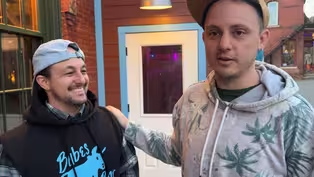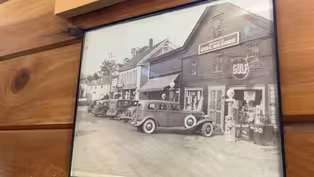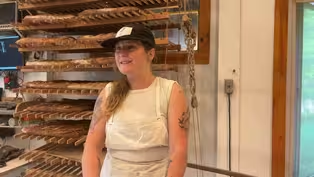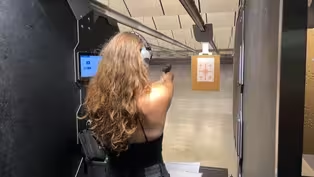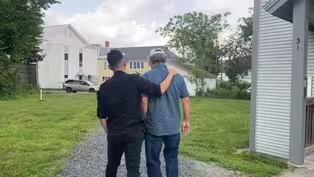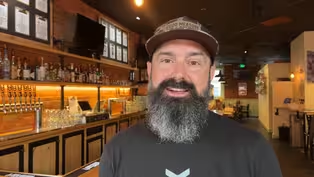Made Here
Vermont Businesses: Woodlawn Farmstead in Pawlet
Special | 7m 20sVideo has Closed Captions
Explore how vertical integration has been essential for this Pawlet, Vermont dairy farm’s survival.
Rocket visits with Seth Leach, the seventh-generation farmer at Woodlawn Farmstead in Pawlet, to explore how vertical integration has been essential for this small dairy farm’s survival. Seth discusses how he and his wife Kate have worked to manage every step in milk production, from growing crops to making cheese to overcome the modern challenge of “buying retail and selling wholesale.
Problems playing video? | Closed Captioning Feedback
Problems playing video? | Closed Captioning Feedback
Made Here is a local public television program presented by Vermont Public
Sponsored in part by the John M. Bissell Foundation, Inc. and the Vermont Arts Council| Learn about the Made Here Fund
Made Here
Vermont Businesses: Woodlawn Farmstead in Pawlet
Special | 7m 20sVideo has Closed Captions
Rocket visits with Seth Leach, the seventh-generation farmer at Woodlawn Farmstead in Pawlet, to explore how vertical integration has been essential for this small dairy farm’s survival. Seth discusses how he and his wife Kate have worked to manage every step in milk production, from growing crops to making cheese to overcome the modern challenge of “buying retail and selling wholesale.
Problems playing video? | Closed Captioning Feedback
How to Watch Made Here
Made Here is available to stream on pbs.org and the free PBS App, available on iPhone, Apple TV, Android TV, Android smartphones, Amazon Fire TV, Amazon Fire Tablet, Roku, Samsung Smart TV, and Vizio.
Providing Support for PBS.org
Learn Moreabout PBS online sponsorshipMore from This Collection
A series of eight video stories, called Small Vermont Businesses in Small Vermont Towns. Filmmaker Rocket's video series was supported in part by Vermont Public's Made Here Fund, launched in 2022 to broaden and diversify Vermont storytelling. Rocket's project was one of 10 projects selected by a jury in and funded in 2023.
Vermont Businesses: Babes Bar in Bethel
Video has Closed Captions
Babes is at once a queer friendly space, a watering hole for locals, (11m 45s)
Vermont Businesses: Willey's Store in Greensboro
Video has Closed Captions
Visit with Rob Hurst, the fifth generation proprietor of Willey’s Store in Greensboro. (13m 18s)
Vermont Businesses: Elmore Mountain Bread
Video has Closed Captions
Visit to a home bakery renowned for its wood-fired, stone-milled breads. (8m 26s)
Vermont Businesses: Parro's Gun Shop
Video has Closed Captions
Visit with the founder and owner of Parro’s Gun Shop & Police Supplies, a firearm emporium. (8m 3s)
Vermont Businesses: Jenna’s Promise is turning tragedy into hope in Johnson
Video has Closed Captions
Visiting a non-profit founded in memory of Jenna Tatro, a victim of the ongoing opioid epidemic. (9m 21s)
Vermont Businesses: Nelson Farms in Irasburg
Video has Closed Captions
The Nelson family, multigenerational dairy farmers operating two dairy farms. (11m 27s)
Vermont Businesses: Good Measure has community, food and beer brewing in Northfield
Video has Closed Captions
Tour a welcoming pub with a seasonal menu and small-batch brews located in downtown Northfield, VT. (7m 41s)
Providing Support for PBS.org
Learn Moreabout PBS online sponsorship-If you're a -small farm, -your days are so numbered.
-When you look at what big -farms are capable of doing, -just - -That there's a there's -a reason why there's a reason -why automobiles are made -in factories.
-I can't compete with it.
-And I don't want to.
-Today we're in Pawlet -on our way -to Woodlawn Farmstead, -which is run and owned -by Seth and Kate Leach, -multi-generational farmers -who are figuring out ways -to adapt dairy to this crazy -commodity market -that milk has become.
-Before -we dive into all of that, -I just want you to -look out the window -beside me and get a sense for -how remote and how freaking -beautiful Pawlet is.
-This is truly one of the -undiscovered gems in Vermont.
-It is -astonishingly beautiful.
-Do you know where -I can find Seth?
-Out bailing hay.
-Look at this view.
-These cows live in a better -view than 99% of humanity.
-So my name is Seth Leach, -and I'm the owner -and operator, at Woodlawn -Farm in Pawlet, Vermont.
-And, I'm the seventh -generation in my family -to run this business.
-We milk about 120 dairy cows.
-grow all of our own grain -and all of our own forages.
-And, we have a -beef business as well.
-We figure, -1831 is when we start here.
-How does it feel?
-What does it mean -to you to be on land -that your family's -been on for so long?
-That's a tough one to -just answer.
-You know, like, -How does it feel?
-It feels like -It doesn't ever feel -like a burden.
-Never.
-It feels like -I mean, basically, -I just want to be -the one that***ks it -up, right?
-Like, it's been going on -for a long time.
-I don't want to be the one -that it falls on its face -under my watch.
-And how much acreage in -going now.
-Right now -the home farm is not quite -400 acres but it's close.
-There's actually about 75 -acres of this upland pasture -that we've been working -pretty hard at -bringing that back to greater -productivity.
-You know, fencing it off, -as you can see, and rotating -the cows through it.
-This is a part of the farm -that we all really love -and have always loved.
-It raises our -heifers in the summer.
-We just moved a group of -them into this, this -fresh paddock -here on the right -this morning.
-We've seeded -we've spread manure up here.
-It's awesome to see that work -yield some results.
-It's it's like it's -a marathon.
-It's not a sprint.
-And where does -your milk go?
-So the milk from our farm, -the majority of it goes -through our co-op, -into Cabot cheese products.
-A portion of it -is actually sold directly -to a couple of cheesemakers -in central Vermont.
-Plymouth Artisan cheese -and Crowley Cheese.
-The majority of dairy farms -in America are entirely, -involved in commodity -markets.
-They sell commodity milk, -and they're their number one -expense is the purchase -of commodity grain -for for their cows.
-When the commodity markets -are unfavorable.
-And as a dairy farmer, -you essentially don't -have any control over -what you get paid for, -what you produce, -nor do you have control -over what you pay for -your single biggest expense.
-I love what Plymouth -and Crowley and I have done.
-They had a need.
-They they couldn't buy -the high quality raw milk -that they needed -in a single source.
-It just it became, like, -unavailable to them -because of trucking and, -you know, proximity to farms -and all this stuff -that just -kind of crumbled on them.
-And I just went to -them and was like, okay, -so I make this much milk.
-Here's the quality -that you could expect.
-Is this interesting to you?
-The answer was yes.
-You know, -and what that's evolved to is -I own a milk truck -in a wash bay -now to make that happen.
-Vertically integrating -it gives me -a degree of control.
-Essentially, -you are creating a product -that is designated -to be sold to people that are -less conscious about price -and more conscious of where -it's coming from.
-Plymouth and Crowley take -they take a wedge of my milk.
-They pay me a fair price -for my milk.
Always.
-It would be a huge deal -if I was selling them -half or more of my milk.
-So I look at, I look at, -consider as this way -to potentially take -another piece -of my production and, -and funnel it into a value -add channel.
-It's scary as hell.
-The idea of saying, well, -you know, going to, -you know, borrow -a bunch of money -to lease a bunch of equipment -and buy my own milk -to make cheese with, and -then hope we can sell enough.
-It's going to be tricky -getting off the map.
-There's no two ways about it.
-With farming, -with agriculture -What you get back is a -function of what you put in.
-I would like to be -considered as someone -that worked really hard, -treated people fairly -and produce the really -quality finished product.
-I consider -all the stuff that I'm trying -to do the challenge -of being a good farmer.
-You know, I don't really know -how to, like, quantify -the feeling of like that -multi-generational thing.
-So much is just like, -it's it's just -in your bones.
Support for PBS provided by:
Made Here is a local public television program presented by Vermont Public
Sponsored in part by the John M. Bissell Foundation, Inc. and the Vermont Arts Council| Learn about the Made Here Fund
